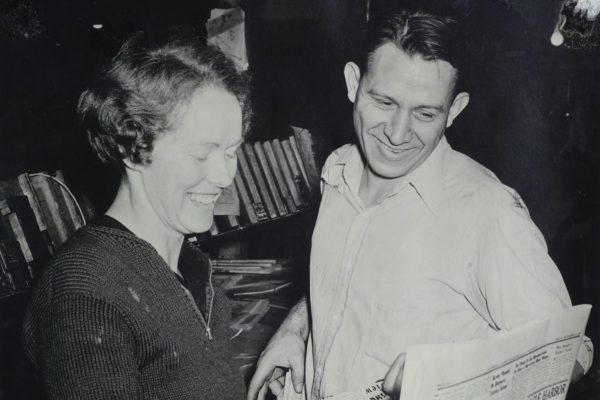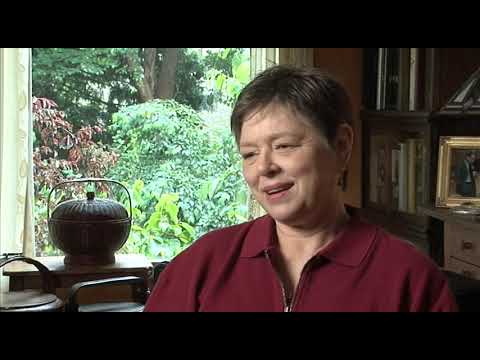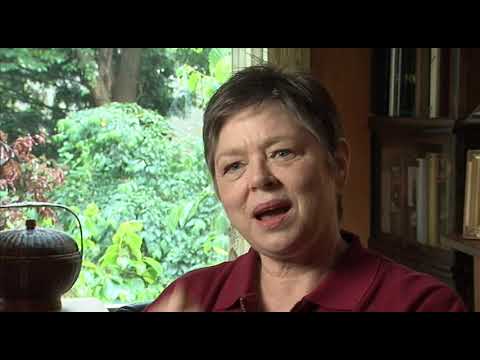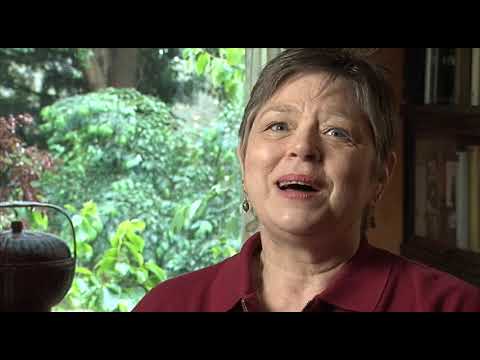Video Interview — August, 2007
Walt and Milly’s background – Mary Woodward (OH0078)
Transcript
My mother was born on Bainbridge. Her parents and two sets of grandparents had sort of a compound in Rolling Bay around the turn of the century. And she was born… most of her siblings were born on the island as well. They didn’t live here full time. My grandfather did something in Wheat, in Eastern Washington. I’ve never been quite clear what that was. So they summered here — and my mother was actually graduated from Roosevelt High School — but she grew up here and there’s actually a little road named after my grandma, on here on the island. All of her siblings settled on the island. So growing up it was great. We had all the aunts and uncles and cousins, and Christmas was really fun time.
My father was born and grew up in Seattle. His parents came from Vermont. And, actually, his grandfather was, I guess a conductor on the Underground Railroad. So he was involved in that in the mid 19th Century. He was doing that. His father came out to be a physician in Seattle. My grandmother who I always thought was very proper, and just when I learned this couldn’t imagine, but she actually got on, as an engaged woman, got on a train and came all the way out to Washington. It was a state by that time, but it was… people had images of it being the Wild West. I can’t imagine her doing that. But maybe she changed over the years. They were married in Seattle, and lived there their whole life, and he graduated from Broadway High School, which is no more. Both my parents went to the University of Washington. My mother was graduated in what was then called Oriental Studies and she studied with Dr. Hebert Gowan. Was fluent in Japanese — reading and writing Japanese — and graduated with honors. My father wasn’t such a good student, but he was in pre–med. I think trying to please his father, maybe, because he always had an interest in journalism from high school on. He was always involved in the paper or… at the University he was involved in the paper as well; actually volunteered as a reporter, worked without pay for the Seattle Times for a while after graduation. And then, I’ve never talked to them independently as to why they ended up there, but they actually met in Juneau, Alaska, My mother was teaching school and my father was working for the Juneau Empire, or something like that, was working for the newspaper and the radio station there and that’s how they met. They came back to Seattle and got married and stayed.
They were married in ’35. They came about that time and my father commuted to the Seattle Times for a while. Mother was a teacher at Bainbridge High School. I’ve talked with a number of people over the last few months who had her as a teacher, and it’s interesting to hear how they describe her and what she did. So she was working at the high school and he was commuting to the Seattle Times. And in — get the days right — I think 1940, they purchased the Review with another couple. The other couple decided after about a year that they really didn’t want to do that, so they bought them out. It was just in 1941, fall of ’41, that they were doing it full time. He quit at the Seattle Times, and so it was in the fall of ’41 that they really committed themselves to the Review, as their… what they were gonna do. But it was you know, it was small town paper… it’s, I don’t know if you read any of the back issues, but it’s just a kick to read. “Jimmy Smith is recovering from pneumonia, and really wants to thank people for all the cards, and there was a very nice tea that Mrs. James Jones…” — you know women never had first names — and it’s just fun to read, very gossipy, when they bought it, and made some changes.





